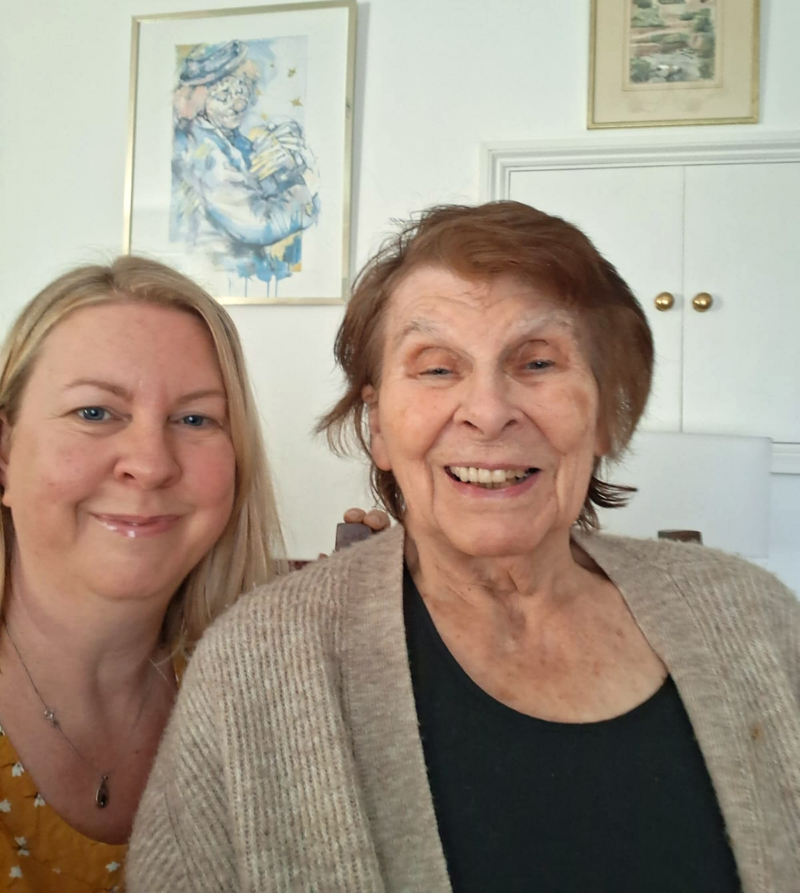Carole lives in Framlingham in a lovely cosy apartment close to the market town centre. She has lived in Suffolk for about 44 years and first moved to the county from London with her husband. At the time, her husband had his own advertising business. They have four children.
Carole first needed additional support to remain at home after becoming ill and needing some time in hospital. She then had support from Home First in the first few weeks to resettle her back at home.
Her son heard about Claire, quite by chance in the line at the local GP surgery. He was there to ask about a care worker for his mum to provide regular support and he was given Claire’s number.
Claire runs her own community micro-enterprise and was supported by the local Suffolk Community Catalysts project. She works hyper locally to where she lives, helping people with their health and wellbeing and to have a good life. She can offer flexible, creative care to the people she supports – personalised care which puts people at the heart of care and is line with current policy drivers around the move from hospital to community care, prevention and Home First.

Claire has been supporting Carole for 2 years and visits her Monday to Friday. They both appreciate the uniqueness of their situation – they see each other as friends, share life updates and have a laugh together.
Carole says that ‘I couldn’t live without Claire’. This is highlighted by the fact that three out of her four children live abroad.
Claire is aware that having a close relationship with Carole helps her do the job better.
She has the time to notice things that could be missed. For example, Claire noticed an issue with Carole’s eyes that needed attention. Likewise, because of the close relationship, Carole feels like she can discuss personal things, which she wouldn’t feel comfortable doing with a stranger, or with lots of different carers popping in.
Carole says that seeing Claire helps reduce loneliness and enables her to retain her independence – ‘coping with a bit of help’. In fact, while visiting Carole, Claire said that she could accompany her into the market town centre to go for a coffee. Carole hadn’t thought of this and looked forward to the outing.
Carole admits she wouldn’t get support from care agencies due to the negative stories she has heard from other people and her initial experience of care when she returned home from hospital.
She says that ‘you shouldn’t have to differentiate between agency care and self-employed care‘, and that we ‘should be offered the same level of care’. She also adds that ‘things have to get better, carers have to be a priority‘, and that ‘carers are people who do well and work hard for the person’.
Carole is aware that care agency staff can’t deviate from the care plan, whereas Claire runs her own business and can go ‘above and beyond’. An example is helping Carole with a new router that had been delivered, which enabled Carole to do her online grocery shopping. If Claire worked for an agency, she wouldn’t have been able to help with this task which has made a big difference to Carole.
Carole’s experience is that agency staff can find it hard to keep to times agreed, provide limited levels of care due to time pressures and don’t always know the local area. If she didn’t have Claire she feels she would just have to cope or start looking for alternative community micro-enterprises.
Carole believes that her situation shouldn’t be unique, it should be the norm – ‘the right thing for everybody’. Carole and Claire both appreciate that their set up is the ‘exception not the rule’. Carole states ‘I know I’m lucky’.
All small businesses need to market their service and community micro-enterprises are no different. In addition to advertising in local GP practices, enterprise leaders can use our Small Good Stuff directory.
People who benefit from support can now leave reviews of the care they have received, helping others to make good care choices. Claire has 7 wonderful reviews from the many people that she supports – she clearly is providing the best type of care for local people in Suffolk.